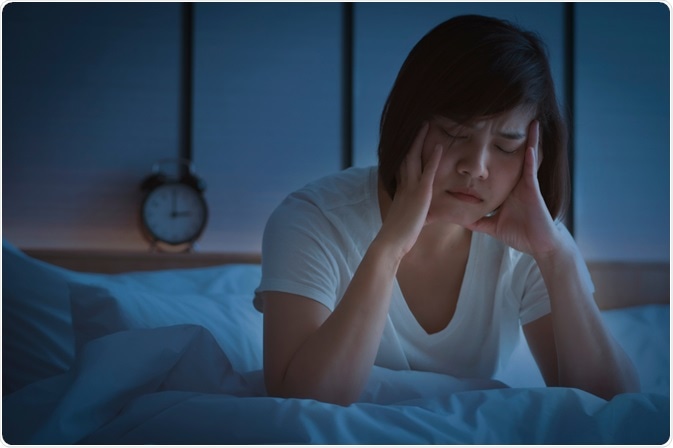Insomnia is an inability to fall asleep or stay asleep long enough to feel well-rested and refreshed in the morning. Insomnia is more common among women than men and is also more likely to occur with increasing age.

Image Credit: chayapat karnnet / Shutterstock.com
An overview of insomnia
Insomnia can have significant negative effects on a person’s quality of life, making it difficult for them to concentrate, pay attention, and function as usual during the day. Insomnia most commonly causes the following problems:
- Difficulty getting to sleep
- Waking throughout the night
- Waking up in the early hours of the morning
- Tiredness and irritability
- Difficulty functioning as usual during the day
The first treatment approach to insomnia is usually finding out whether there are any underlying causes of the condition. In the event that an underlying medical condition is responsible for the insomnia symptoms, the condition can then be treated to help alleviate the sleep-related symptoms without requiring further medical interventions. Other approaches that healthcare professionals may take are described below.
Good sleep hygiene
A doctor will advise patients on the measures they can take at home to help improve their chances of a good night’s sleep. This is known as “sleep hygiene,” and healthcare providers will generally suggest trying this approach for at least three or four weeks and subsequently follow up with their patients to determine whether their insomnia symptoms have improved.
Sleep hygiene involves:
- Setting fixed times for going to bed and waking up, which will help establish a regular sleeping pattern.
- Trying to relax before bedtime by having a warm bath, listening to soothing music, or reading.
- Ensure the sleeping environment is comfortable in terms of temperature, noise level, and light.
- Avoid napping during the day.
- Avoid nicotine, alcohol, and caffeine late at night.
- Exercising regularly, although not for at least four hours before bed.
- Avoid eating heavy meals or spicy foods late at night.
- Only use the bedroom for intimacy or sleeping.
- Avoid checking the clock, as this can cause frustration and prevent a person from getting back to sleep.
- Putting away or turning off any electronic devices with screens, such as phones or televisions, as the light emitted from these can make the brain more alert.
How To Cure Insomnia Fast (5 QUICKEST WAYS)
Cognitive and behavioral treatment
If a person has long-term insomnia, which is defined as insomnia for more than four weeks, a doctor may recommend cognitive and behavioral therapy. This treatment approach aims to alter any unhelpful thoughts or behaviors that might be contributing to the patient's insomnia.
Other behavioral therapies that may be recommended include:
- Stimulus-control therapy, which helps a person associate the bedroom with sleep and establish a regular sleeping pattern.
- Sleep restriction therapy, which involves a person limiting their time in bed to only when they are asleep, which creates mild sleep deprivation. As sleeping improves, so does sleep time.
- Paradoxical intention, which involves staying awake and avoiding any intention of falling asleep. This only works if a person has trouble falling asleep rather than a problem with maintaining sleep.
- Relaxation training, where the aim is to reduce tension and minimize any thoughts that may be disrupting sleep.
Pharmacotherapy
For patients suffering from chronic insomnia, healthcare providers may also consider prescribing a sleeping tablet, particularly if symptoms are severe or the above cognitive and behavioral approaches have failed to work. However, doctors are generally reluctant to prescribe these tablets because they do not address the cause of the problem and cannot help in the long term.
If sleeping tablets are used, doctors usually prescribe the smallest effective dose for no longer than a week. Sleeping tablets can sometimes cause side effects, such as a feeling of being hungover and daytime drowsiness. Short-acting benzodiazepines or “Z medicines” are the preferred drugs for treating insomnia.
Benzodiazepines
Benzodiazepines are tranquilizers that are used to reduce anxiety and help people become calm, relaxed, and sleepy. These medications can lead to dependency and only short-acting versions that have short-term effects should be prescribed. The most commonly prescribed benzodiazepine for insomnia is Temazepam.
Z medicines
Z medicines are a newer type of short-acting drug that works in a similar way to benzodiazepines. Some examples of z medicines include zaleplon, zolpidem, and zopiclone.
Zaleplon is used to treat people who find it hard to fall asleep, whereas zolpidem is used to treat debilitating insomnia or insomnia that is causing severe distress. Thirdly, zopiclone is used to treat difficulty falling asleep, waking during the night, debilitating insomnia, or insomnia causing severe distress.
Antidepressants
Sometimes, antidepressants are prescribed to treat insomnia, particularly in cases where an individual has a history of depression.
Melatonin
Medicines containing melatonin can be effective at relieving insomnia symptoms for up to 26 weeks among elderly individuals. This naturally occurring hormone helps to regulate the sleep cycle or circadian rhythm.
Complementary therapies
Sometimes, healthcare providers consider complementary therapies such as acupuncture or homeopathy to treat insomnia. However, there is little evidence to suggest that these treatment approaches are effective.
Some herbal remedies, such as passionflower and chamomile, have been shown to have some positive effects in the treatment of insomnia.
References
Further Reading
Last Updated: Mar 11, 2023